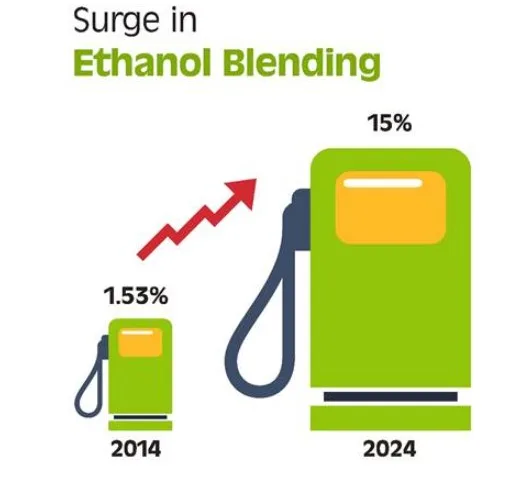Syllabus: GS3/Environment
Context
- According to the Honda Motor Co Ltd, India has the advantage of achieving carbon neutrality but the government needs to make prices of bioethanol fuel more affordable.
Major Suggestions
- The government should create a mechanism to make fuel pricing more affordable and maintain economic viability for users through its policies.
- Vehicle manufacturers should continue to take initiatives to improve fuel efficiency.
- For the ethanol fuel to remain economically viable the fuel cost per km must be kept the same or lower compared to gasoline vehicles.
- To achieve this, initiatives including reducing tax on ethanol should be considered.
Ethanol
- It can be produced from sugarcane, maize, wheat, etc which are having high starch content.
- In India, ethanol is mainly produced from sugarcane molasses by fermentation process.
- It can be mixed with gasoline to form different blends.
- Application: It is widely used not only as an alternative fuel source but also in various industries as a chemical solvent and in the synthesis of organic compounds.
- Ethanol also has medical applications as an antiseptic and disinfectant, adding to its versatile uses.
Ethanol Blending
- Ethanol blending refers to the practice of mixing ethanol with gasoline to create a fuel mixture that can be used in internal combustion engines.
- There are a few common blends:
- E10: This is a mixture of 10% ethanol and 90% gasoline. It is the most common blend and is used widely in many countries.
- E15: This blend contains 15% ethanol and 85% gasoline.
- E85: This is a high-ethanol blend, consisting of 85% ethanol and 15% gasoline. It’s used in flex-fuel vehicles designed to run on higher ethanol content.
Need
- As of March 2024, around 98% of the fuel used in the road transportation sector comes from fossil fuels, while only 2% is met by biofuels like ethanol.
- This dependency on fossil fuels presents challenges related to energy security, foreign currency outflow, and environmental impact.
- With ethanol blending, India has a promising opportunity to reduce its dependence on imported oil while addressing environmental concerns.
India’s Ethanol Blending Program
- The Ethanol Blended Petrol (EBP) programme was launched in 2003.
- The programme sought to promote the use of alternative and environment friendly fuels and to reduce import dependency for energy requirements.
- Objectives
- Reduce Import Dependence: India aims to decrease its reliance on imported crude oil, thereby improving energy security.
- Environmental Benefits: Ethanol is a cleaner-burning fuel compared to gasoline, which helps in reducing air pollution and greenhouse gas emissions.
- Support for Farmers: The program supports the agricultural sector by providing a market for ethanol, which is often derived from sugarcane, corn, or other crops.
- Key Components
- Blending Targets: India has set specific targets for ethanol blending. For instance, the National Policy on Biofuels (2018) outlines a target of 20% ethanol blending in petrol by 2025-26.
- Phased Implementation: The blending targets are being rolled out in phases, gradually moving towards higher blends like E20.
- Infrastructure Development: The government has been investing in the infrastructure necessary for ethanol production, storage, and distribution, including establishing more ethanol production facilities and blending units.
Major Achievements of EBP
- After achieving 15% ethanol blending in 2024, the government set an ambitious target of achieving 20% blending by 2025-26.

Challenges
- Infrastructure: Developing the necessary infrastructure for large-scale ethanol production and blending can be complex and costly.
- Feedstock Availability: Ensuring a steady and adequate supply of raw materials for ethanol production, such as sugarcane, can be challenging, especially in the face of changing agricultural conditions and market fluctuations.
- Consumer Acceptance: Educating consumers and ensuring that vehicles can run efficiently on higher ethanol blends are also important for the program’s success.
Conclusion
- India’s Ethanol Blending Program is a significant step towards a more sustainable and self-reliant energy future, aligning with broader goals of environmental protection and energy independence.
Source: LM
Previous article
Accessibility of Antivenoms in India
Next article
US Withdrew from the Paris Agreement